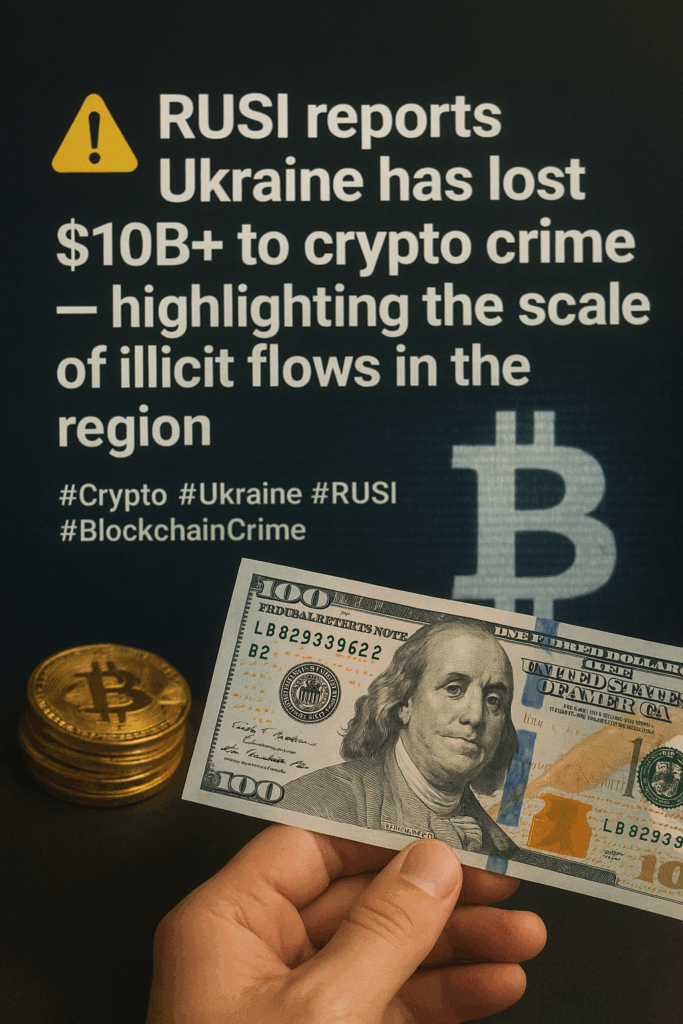Executive summary
A new taskforce report from the Royal United Services Institute (RUSI) warns that Ukraine’s weakly regulated crypto market has opened the door to large-scale illicit finance. Experts estimate that with proper oversight Ukraine could recover up to $10 billion that is currently being siphoned off through over-the-counter (OTC) crypto brokers, “money-mule” networks (“drops”), sanctions-evasion schemes, and tax leakage. Media coverage has framed this as $10B+ already lost—but the underlying report highlights recoverable billions if reforms are enacted soon.
What RUSI actually found
- Recoverable billions: Experts estimate that with improved oversight, Ukraine could recover up to $10 billion. This reflects ongoing leakage, not just past loss.
- Money-mule (“drops”) losses: Ukraine’s state budget may be losing about UAH 1 billion (~$24 million) per month to crypto-related “drops” schemes. Local banks have already shut down ~80,000 mule accounts in the past year.
- OTC brokers everywhere: OTC crypto desks are active in nearly every major Ukrainian city and often operate outside compliance systems.
- Sanctions-evasion & Russian nexus: OTC networks are used to procure sanctioned goods for Russia and move funds discreetly—turning Ukraine into a potential “threat hub” for illicit finance.
Bottom line: The “$10B lost” headline is shorthand for the scale of preventable and recoverable leakage that RUSI believes regulation could address.
How we got here: stalled rules and a fast-moving market
- A law on paper, a gap in practice: Ukraine passed the Law on Virtual Assets in 2022, but full implementation stalled—especially around taxation and regulator designation. This left a grey zone where OTC brokers and P2P markets thrived.
- New draft to align with MiCA: In April 2025, parliament received Draft Law No. 10225-d to align with the EU’s MiCA framework, introduce licensing for platforms, and codify KYC/reporting.
- Why this matters now: RUSI argues that registering the first licensed exchange and moving forward with the law would show progress to international partners, reduce capital flight, and improve oversight.
Where the $10B+ goes: key illicit channels
- OTC crypto brokers & cash points
- Convert fiat ↔ crypto with minimal traceability.
- Exploited for sanctions evasion, laundering, and tax evasion.
- Money-mule (“drops”) schemes
- Citizens rent out bank cards/accounts for small fees, enabling criminals to launder funds.
- Estimated $24M/month lost; ~80,000 mule accounts shut down last year.
- Sanctions-evasion pipelines
- OTC rails help procure components for Russia’s military and move value for sanctioned actors.
- Tax leakage and scams
- Unlicensed exchanges and opaque flows reduce taxable revenue.
- Victims of scams have little recourse.
Policy fixes RUSI and experts recommend
- Pass the virtual-assets tax & licensing law (10225-d)
- Licensing, KYC/AML, and reporting made obligatory.
- Aligns with EU MiCA standards.
- Name the regulators—then supervise
- The National Bank of Ukraine for banks/EMTs; securities commission for exchanges.
- Ends jurisdictional ambiguity.
- Stand up a VASP licensing pipeline
- Registering the first licensed exchange would signal compliance readiness.
- Target OTC brokers with onsite inspections
- Supervision of both licensed and unlicensed exchanges to curb illicit flows.
- Crack down on “drops”
- National registry of money-mules, stricter KYC controls, and awareness campaigns.
- Public-private partnerships (PPPs)
- Regulators should gain direct access to blockchain analytics and exchange data.
- Capacity building for judges, LEAs, and banks
- Standardized KYC questionnaires, crypto-forensics training, and admissibility of blockchain evidence in courts.

What to watch next (Q4 2025)
- Movement in parliament on the Draft Law 10225-d.
- First VASP registration and supervisory guidance for exchanges.
- Inspection stats: progress on OTC oversight and mule account shutdowns.
- Court enforcement: growing use of blockchain evidence.
Why this matters beyond Ukraine
Illicit crypto flows don’t respect borders. Ukraine’s vulnerabilities—amplified by wartime disruption and legal limbo—are being weaponized by sanctioned Russian actors and transnational crime groups. Closing this loophole is both a national-security issue for Ukraine and a sanctions-enforcement issue for its allies.











